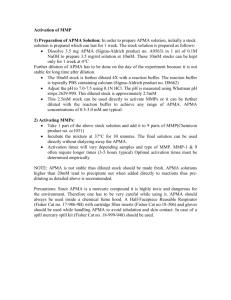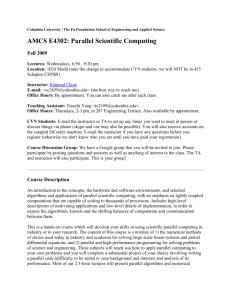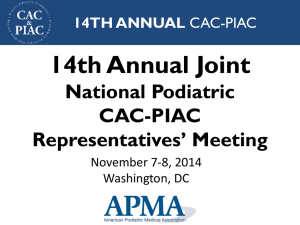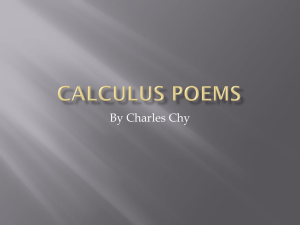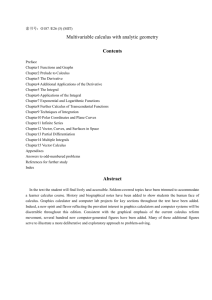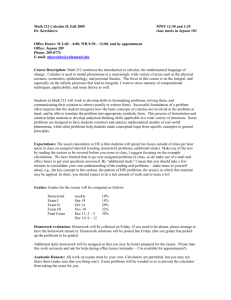Students with credit for APMA 111 will take APMA 212. Advance
advertisement
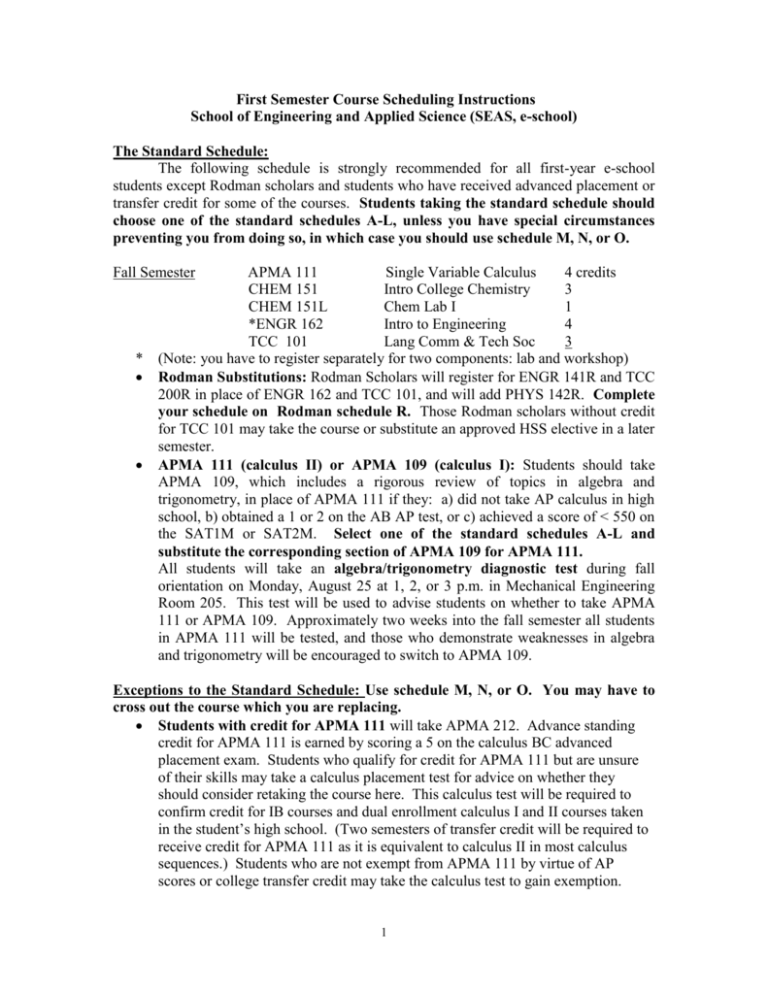
First Semester Course Scheduling Instructions School of Engineering and Applied Science (SEAS, e-school) The Standard Schedule: The following schedule is strongly recommended for all first-year e-school students except Rodman scholars and students who have received advanced placement or transfer credit for some of the courses. Students taking the standard schedule should choose one of the standard schedules A-L, unless you have special circumstances preventing you from doing so, in which case you should use schedule M, N, or O. Fall Semester * APMA 111 Single Variable Calculus 4 credits CHEM 151 Intro College Chemistry 3 CHEM 151L Chem Lab I 1 *ENGR 162 Intro to Engineering 4 TCC 101 Lang Comm & Tech Soc 3 (Note: you have to register separately for two components: lab and workshop) Rodman Substitutions: Rodman Scholars will register for ENGR 141R and TCC 200R in place of ENGR 162 and TCC 101, and will add PHYS 142R. Complete your schedule on Rodman schedule R. Those Rodman scholars without credit for TCC 101 may take the course or substitute an approved HSS elective in a later semester. APMA 111 (calculus II) or APMA 109 (calculus I): Students should take APMA 109, which includes a rigorous review of topics in algebra and trigonometry, in place of APMA 111 if they: a) did not take AP calculus in high school, b) obtained a 1 or 2 on the AB AP test, or c) achieved a score of < 550 on the SAT1M or SAT2M. Select one of the standard schedules A-L and substitute the corresponding section of APMA 109 for APMA 111. All students will take an algebra/trigonometry diagnostic test during fall orientation on Monday, August 25 at 1, 2, or 3 p.m. in Mechanical Engineering Room 205. This test will be used to advise students on whether to take APMA 111 or APMA 109. Approximately two weeks into the fall semester all students in APMA 111 will be tested, and those who demonstrate weaknesses in algebra and trigonometry will be encouraged to switch to APMA 109. Exceptions to the Standard Schedule: Use schedule M, N, or O. You may have to cross out the course which you are replacing. Students with credit for APMA 111 will take APMA 212. Advance standing credit for APMA 111 is earned by scoring a 5 on the calculus BC advanced placement exam. Students who qualify for credit for APMA 111 but are unsure of their skills may take a calculus placement test for advice on whether they should consider retaking the course here. This calculus test will be required to confirm credit for IB courses and dual enrollment calculus I and II courses taken in the student’s high school. (Two semesters of transfer credit will be required to receive credit for APMA 111 as it is equivalent to calculus II in most calculus sequences.) Students who are not exempt from APMA 111 by virtue of AP scores or college transfer credit may take the calculus test to gain exemption. 1 Students who feel that they should be placed in a more advanced course than APMA 212 should contact Prof. Roberts (wwr, 924-6216) to arrange a test to gain such placement. The calculus placement tests will be administered on Tuesday, August 31 at 9:00 a.m. in MEC 205. Substitutions for TCC 101: Students with AP or transfer credit for TCC 101 should normally register for an HSS Elective instead. Students who receive a 5 on the English Language AP exam will receive credit for TCC 101. Students who receive a 720 or better on the SAT II Writing test will place out of TCC 101 but will have to substitute an approved HSS elective. The following students will be required to take a written English diagnostic test: 1) Students whose first language is not English and who have been in the United States fewer than six years will take a test to determine if they are ready for TCC 101 or should take TCC 100, a non-credit English as a Second Language (ESL) course. 2) Students with dual-enrollment credit for English composition courses taken in their high schools will take a test to determine if their skills are adequate to receive credit for TCC 101. These will be separate tests both given on Monday, August 25 at 1:00 pm. in THN D221 and 222, respectively. Substitutions for CHEM 151/151L: SEAS students will receive credit for CHEM 151, CHEM 151L, CHEM 152, and CHEM 152L for a 4 or 5 on the Chemistry AP Test. The following are possible substitutions for CHEM 151 on your schedule: ECE 200, MSE 209, CS 101, CE 205, ECE 203, MAE 200, MAE 201, CE /MAE 230, ECE/CS 230, CHE /MAE 210, SYS 201, or CS 202. You may also consider an introductory course in an area in which you may want to minor. You should consult the Undergraduate Record and obtain the approval of your advisor before enrolling in these courses, to make sure you have the necessary prerequisite background. You should also discuss your background for the course with the course instructor at the beginning of the class. Other students wishing to deviate from the standard schedule should discuss their choices with their faculty advisor and Dean Marshall. Such deviations may impact their preparation for the major of their choice and in some cases their ability to graduate in four years. Students who have decided not to pursue an engineering degree should consult the school of your choice regarding an appropriate course schedule. Record your choices on a blank schedule sheet and be sure to include the 5-digit schedule number. Until you are officially accepted into another school you are considered an engineering students and will be subject to the regulations and procedures of SEAS. Other AP Credit Physics. Two AP Physics courses are taught in the high schools. The Physics C course is a calculus-based course. The associated AP test consists of two parts: Part I (Mechanics) and Part II (Electricity and Magnetism). A score of 4 or 5 on Part I earns three hours credit for PHYS 142E. A score of 4 or 5 on Part II earns three hours credit for PHYS 241E. No lab credit is awarded for either courses, so all students will be required to take both PHYS 142W and PHYS 241W. The Physics B course is a non-calculus-based physics course. A score of 4 or 5 on the 2 Physics B Test earns credit for PHYS 201 and PHYS 202. These courses will not satisfy any SEAS degree requirement but will be listed on the transcript. Biology. Students who have received a score of 4 or 5 on the Biology AP test will receive 6 hours credit for BIOL 201-202. These hours can be used to satisfy the Science Elective I requirement. Credit for the laboratory is not included. Computer Science. Students who have received a 4 or 5 on the AB test or a 5 on the A test will receive credit for CS 101. Students without AP credit but who have advanced programming skills should take a placement test given on Monday, August 25 at 2:00 p.m. in Olsson 120. Students who pass the placement test will place out of CS 101, but will not receive credits. Credits will need to be replaced by another 3 hour computer science or technical course. Electives. Credit for HSS and Unrestricted electives is normally awarded for a 4 or 5 on the appropriate AP test or a 5, 6, or 7 on the equivalent IB Higher Level test. For more information: http://www.virginia.edu/registrar/records/ugradrec//chapter2/chapter2.htm#ap http://artsandsciences.virginia.edu/undergrad/policies/2003/international_exams.php Students seeking evaluation of transfer, AP, or international test (IB Higher Level, A-level etc.) credits should consult the staff in Thornton Hall A 122. Course Load Requirement (“15 hour rule”) Semester Course Loads. Every student is expected to take a minimum of 15 graded credit hours of course-work each semester unless she/he secures the permission of her/his advisor and the Dean's office to register for fewer credits. Petitions are available in THN A-122. Unless you think you have a particularly weak academic background you should attempt a normal load and drop a course, if necessary, before the DROP date. If you feel you must take a reduced load consult your advisor. No courses taken on a Credit/No Credit basis can satisfy any degree requirement in the SEAS, nor will they satisfy the "15-hour minimum" rule. Course Overloads: Students with a strong academic background (e.g. SAT scores of 1400 and above) may wish to take an extra course. Possibilities include a University Seminar (USEM) or one of the courses mentioned for students with AP credits. You should consider an extra course only if you have a strong background in mathematics and chemistry, and after consultation with your faculty advisor. If you choose to enroll in an extra course, evaluate your ability to handle the increased load before the DROP deadline, and drop the course if you feel overloaded. An overload of 20 or more hours of course-work per semester requires advisor and Dean's office approval. Add, DROP, and Withdrawal Add Deadline: Tuesday, September 9 Drop Deadline: Tuesday, October 7 Withdrawal Deadline: Monday, November 24 Students may drop courses before the DROP deadline at their discretion as long as it does not reduce their course load below 15 credit hours, for which they need the approval of their advisor and the Dean’s office. Dropped courses will not appear on your academic transcript. 3 Withdrawal from a course after the drop date requires that a student petition the office of the Dean. Petitions must be signed by the course instructor and the faculty advisor. Students may be granted one Withdrawal for personal reasons. Subsequent petitions to withdraw will be denied unless there are extenuating circumstances. A Withdrawn course will appear on your academic transcript with the notation W, but will not affect your GPA. Petitions are available in A 122 Thornton Hall. What if I find that my load is too heavy or I’m over my head in a course? See your faculty advisor immediately. Discuss your situation with your instructor(s). Utilize the faculty and GTA assistance available with the course. Tutoring is available. Contact A 126 Thornton Hall, 924-3310. Requests to drop a course that will reduce your schedule to < 15 hours should be made to Dean Marshall before the Drop deadline. After that date, until the Withdrawal deadline, you may petition to Withdraw, but if approved a W will appear on your transcript. Scholarships: The SEAS receives a number of industrial or foundation scholarships for which students may apply. These are usually one-time awards. Amounts and selection criteria vary. For more information contact A-126 Thornton Hall, 924-3310. Internships, Co-ops: Career Development Office. C. J. Livesay, Director - THN A 115 Office of Minority Programs: The Office of Minority Programs is available to help all students by providing academic support, counseling, financial assistance, motivational activities, and other special services. C. Vallas, Director - Thornton Hall D111 Major Selection: Takes place around April 1. Every major has a faculty contact available to talk with interested students. A list is available in THN A122 or in the SEAS Undergraduate Handbook (on-line). Systems Engineering, Computer Science and Computer Engineering have caps on the number of majors they can accept. Admission will be based on academic performance in the first year. Study Abroad: Milton Adams, 924-3310, THN A 126 For More Information: For the most up to date course offering information see the Course Offering Directory on line: http://codd.itc.virginia.edu/cod/index.cgi For more information on SEAS academic regulations and UVA student services consult the SEAS Undergraduate Handbook on the web: http://www.seas.virginia.edu/advising/ For major curricula, course descriptions and prerequisite requirements, see the Undergraduate Record: http://www.virginia.edu/~regist/ugradrec/ Assistant Dean for Undergraduate Programs – Paxton Marshall, A 122 Thornton Hall, 924-3164, marshall@virginia.edu 4 ppm 6/18/03 5

